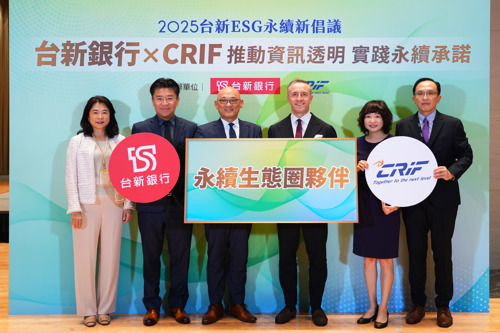CRIF’s Taiwan ESG Bureau empowers financial institutions with reliable data for green financing decisions
Taipei, Taiwan, 7 May 2025 – In a joint effort to advance sustainable finance and accelerate the net-zero transition among Taiwanese enterprises, CRIF, a global leader in credit bureau, business information, and credit risk solutions, has entered into a strategic partnership with Taishin Bank. Through this collaboration, Taishin Bank will leverage CRIF’s Taiwan ESG Bureau to strengthen its ESG risk assessment and support responsible green financing.
Announced today at a strategic partnership launch ceremony, the initiative marks a key milestone for Taiwan’s financial sector. Taishin Bank will integrate the Taiwan ESG Bureau —a pioneering platform providing estimated carbon emissions and physical risk indicators for 1.6 million Taiwanese companies—into its Know Your Customer (KYC) and credit evaluation processes. The partnership strengthens ESG due diligence and enables more data-driven, transparent, and impactful financing decisions.
Empowering ESG Governance with Comprehensive Data
As sustainability standards evolve globally, financial institutions are expected to play a proactive role in identifying ESG-ready businesses and guiding them through the transition.
Steven Chang, CEO of Wholesale Banking Group Taishin International Bank said: “Many companies, especially small and medium-sized enterprises (SMEs), face challenges due to fragmented or insufficient ESG data. With CRIF’s Taiwan ESG Bureau, we now have a unified, standardized framework to better evaluate and support their sustainability progress.”
Added Daniel Yu, Country Director for CRIF in Taiwan, “At CRIF, we are committed to enabling businesses of all sizes to thrive in a sustainable economy. Our partnership with Taishin Bank marks the first time the Taiwan ESG Bureau is being deployed by a financial institution in Taiwan, providing critical insights that help banks guide clients on their ESG journeys and unlock green financing opportunities.”
Developed by CRIF, the Taiwan ESG Bureau aims to lower the threshold for ESG disclosure, especially for resource-limited SMEs, by offering accessible and standardized ESG data. The platform aggregates over 1,000 reports from listed companies and approximately 400 voluntary SME disclosures.
Leveraging proprietary models, it estimates carbon emissions for 1.6 million Taiwanese enterprises and includes assessments of two key physical risks: flood and landslide. The Taiwan ESG Bureau spans major industries including manufacturing, services, electronics, and real estate, and supports businesses of all sizes—from microenterprises to large corporations—in navigating their ESG transition.
Unlocking Access to Green Finance
As the global spotlight on climate action intensifies, Taiwan’s Financial Supervisory Commission (FSC) continues to push for stronger sustainable finance policies through its “Green and Sustainable Finance Action Plan”. Financial institutions are expected to identify climate-related risks, facilitate the decarbonization of high-emission sectors, and promote low-carbon innovation.
In this evolving landscape, transparent ESG disclosure has become essential—not just for reputation, but as a gateway to capital and participation in the broader green finance ecosystem. CRIF’s Taiwan ESG Bureau supports this shift by equipping businesses with standardized reporting tools and incentivizing ESG disclosures through certifications and performance benchmarks. These capabilities also enable banks like Taishin to assess clients’ ESG maturity and financing potential more effectively.
With ESG embedded into its core business strategy, Taishin Bank is set to initially prioritize SME clients in its ESG Bureau rollout—encouraging them to begin their sustainability journey through data disclosure and access to green financing solutions.
Looking Ahead: A Data-Driven Sustainable Financial Ecosystem
CRIF and Taishin Bank will continue to deepen their collaboration, co-developing new use cases that leverage ESG data to support policy alignment, enterprise transition, and financial innovation. The partnership also aims to foster a robust, data-powered ESG ecosystem that delivers long-term value for businesses, financial institutions, and society.
